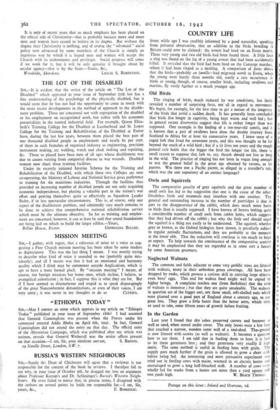THE LOT OF THE DISABLED
SIR,—It is evident that the writer of the article on "The Lot of the Disabled" which appeared in your issue of September 25th last has a fine understanding of the psychology of the physically disabled, but it would seem that he has not had the opportunity to come in touch with the more recent developments in the method of approach to the disable- ment problem. These are concerned not with segregation of the disabled or his employment on occupational work, but rather with his economic potentialities in the normal industrial field. For example, Queen Eliza- beth's Training College for the Disabled at Leatherhead and St. Loyes College for the Training and Rehabilitation of the Disabled at Exeter have, during the last few years, between them placed the best part of one thousand disabled people in employment and nearly 8o per cent. of them in such branches of organised industry as engineering, precision instrument making, arc welding, watch and clock making and repairing, &c. Those so placed have been men of all ages whose disablement was due to causes varying from congenital disease to war wounds. Disabled women now share these training facilities.
Under its recently initiated Interim Scheme for the Training and Rehabilitation of the Disabled, with which these two Colleges are now co-operating, the Ministry of Labour and National Service gives preference to training for the munitions industries. Through the facilities thus provided an increasing number of disabled people are not only acquiring economic independence, but playing a valuable part in the nation's war effort and proving themselves quite as effectively as Squadron Leader Bader, if in less spectacular circumstances. This is, of course, only one aspect of the disablement problem, and admittedly very much remains to be done to achieve that comprehensive national rehabilitation service which must be the ultimate objective. So far as training and employ- ment are concerned, however, it can at least be said that sound foundations are being laid on which to build the larger edifice.—Yours,


























 Previous page
Previous page